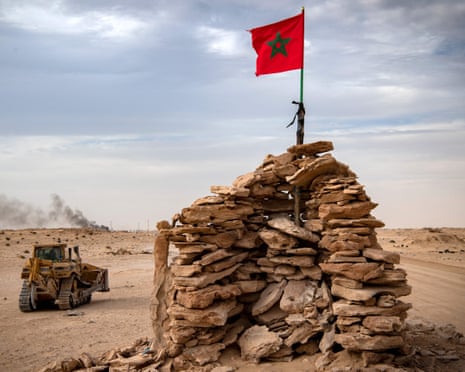
The UN security council has approved a US-backed resolution supporting Morocco’s claim to the disputed Western Sahara, despite fierce opposition from Algeria.
Although Friday’s vote was divided, the resolution offers the strongest endorsement yet for Morocco’s plan to keep sovereignty over the territory, which also has backing from most European Union members and a growing number of African allies.
The resolution refers to Morocco’s plan as a basis for negotiation. As with similar resolutions in previous years, the text makes no mention of a referendum on self-determination that includes independence as an option, which is the solution long favoured by the pro-independence Polisario Front and its allies, including Algeria, Russia and China.
Western Sahara is a phosphate-rich stretch of coastal desert the size of Colorado that was under Spanish rule until 1975. It is claimed by Morocco and Polisario Front, which operates from refugee camps in south-western Algeria and claims to represent the Sahrawi people indigenous to the disputed territory.
The US, which sponsored the resolution, led 11 countries in voting in favour, while three countries – Russia, China and Pakistan – abstained. Algeria, Polisario’s primary benefactor, opposed the measure.
Mike Waltz, the US ambassador to the UN, said the vote had been “historic” and would “build on the momentum for a long, long overdue peace in Western Sahara”.
Amar Bendjama, the Algerian ambassador to the UN, said that while the resolution was an improvement on previous iterations, it “still has a number of shortcomings”.
“It is below, below, I say, of the expectations and the legitimate aspirations of the people of Western Sahara, represented by the Polisario Front,” he said.
The resolution says “genuine autonomy under Moroccan sovereignty could constitute a most feasible solution”.
The measure also renews the UN peacekeeping mission in Western Sahara for another year, as has been done for more than three decades. Prior extensions, however, have not included a reference to Morocco and its allies’ preferred outcome.
The UN resolution calls on all parties involved to “seize this unprecedented opportunity for a lasting peace.” Depending on progress, it asks António Guterres, the secretary general, to review the peacekeeping mission’s mandate within six months.
The shift could unsettle a long-stalled process that for decades has eluded resolution, despite a UN peacekeeping mission that was designed to be temporary. Demonstrations have ensued in Sahrawi refugee camps in Algeria this week, where people have vowed not to give up their fight for self-determination.
Morocco controls nearly all of Western Sahara, except for a narrow strip known as the “free zone” that lies east of a Moroccan-built sand wall.
A 1991 ceasefire was meant to pave the way for a referendum on self-determination, but fighting over voter eligibility prevented it from taking place.
Over the years, Morocco has transformed the disputed territory, constructing a deepwater port and a 656-mile (1,055-km) highway. State subsidies keep food and energy prices low, and the population has ballooned as Moroccans settle in cities such as Dakhla and Laayoune.
Polisario withdrew from the ceasefire in 2020 after clashes near a road Morocco was paving to Mauritania.
The group has since regularly reported military activity, while Morocco has mostly denied open conflict. The United Nations calls it “low-level hostilities”.
In response to the draft resolution, Polisario said that it would not join any process aiming “to ‘legitimise’ Morocco’s illegal military occupation,” saying peace “can never be achieved by rewarding expansionism”.
Morocco’s Foreign Ministry did not respond to questions before the vote but its king, Mohammed VI, said afterwards that the move was “opening a new and victorious chapter in the process of enshrining the Moroccan character of the Sahara, which is intended to bring this issue to a definitive close”.
The conflict is the driving force in north African diplomacy. Morocco considers support for its autonomy plan as a benchmark for how it gauges its allies.
Last October, UN envoy Staffan de Mistura suggested partitioning Western Sahara, a proposal neither side accepted. He urged Morocco to clarify what autonomy would entail and warned a lack of progress might raise questions about the United Nations’ role and “whether there is space and willingness for us to still be useful.”
The push to reassess the United Nations Mission for the Referendum in Western Sahara comes as the United States slashes funding for UN programmes and agencies, including peacekeeping.
US officials are taking an a la carte approach to funding, picking which operations and agencies they believe align with Trump’s agenda and which no longer serve US interests. They argue that the UN’s budget and agencies are bloated. They pledge to halt new contributions pending a review of every UN agency and programme.